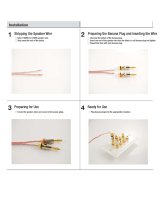
ww w.PyleUSA.com
4
2. Connecting the Power Supply
Be sure that the volume/power switch on the front panel is in the OFF position
by rotating it counter clockwise.
Connect the cable with the round end from the power supply to rear panel
power connector. Connect the AC power cable from the power supply to a power
outlet and verify that the indicator light on the power supply is illuminated.
We recommend using a high-quality surge suppressor and/or AC line later on
all electronics equipment.
3. Connecting Audio Sources
Using the appropriate audio cable (RCA cable), connect your audio source
(computer, iPod, etc.) to the amplier audio inputs.
If you got the Wireless BT amplier and want to connect the amplier to the
audio source via Wireless BT, you can pair them when the amplier is turned on.
Audio Wireless BT ampliers can connect to only one device at a time, however,
they will remember the devices they connected, they will auto-paired at next
time.
NOTE:
Audio Wireless BT ampliers have the "BT" and "AUX" selector, you can choose the
input way when you connect the audio source. The RCA input will interrupt, so if
you want to connect the amplier with RCA input, you need interrupt the Wireless
BT connection from your Wireless BT device.
4. Operation
Turn on the amplier volume/power knob and set the volume control to an
initial setting of about 3 o'clock. The front panel power indicator will be
illuminated. Turn on your audio input source and adjust the volume to your
desired listening level.
This product can expose you to a chemical or group of chemicals, which may include
“Nickel Carbonate” which is known in the state of California to cause cancer, birth defects,
or other reproductive harm. For more info, go to https://www.p65warnings.ca.gov/.






